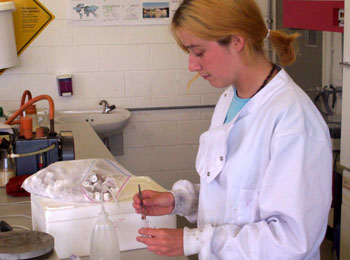| 2003 |

|
YEAR BOOK |
Galway-Mayo Institute of Technology
|
Allozyme markers in genetic stock identification of Blue Whiting and Haddock
|

Haddock (Melanogrammus aeglefinus) is also a commercially important species in Ireland, with over �10million being generated from it in 2001. Haddock is found in Irish waters around the whole country and is separated into different stocks based on their location. There are little data as to whether this separation of the fish into different stocks has any genetic basis.
The aim of the research is to analyse the population structure of Blue Whiting in the Northeast Atlantic and the population structure of Haddock around Ireland. Genetic variation, at the level of proteins, is being identified and quantified using gel electrophoresis. This technique separates different protein products of alleles (allozymes), and is followed by staining to visualize these protein products. The usefulness of the method lies in the fact that the genotype of an individual, with respect to the gene locus (loci) coding for a particular protein, can be inferred from the banding pattern on the gel. From the results, one can ascertain the population structure of the fish, yielding data on breeding habits, reproductive strategies and stock structure. If there are discrete stocks present, there can be implications for management of the fishery.
The research is funded by the Department of Education�s Technological Sector Research Program, Strand 3 (2002-2005).
Contact: Karen McCrann & Dr Elizabeth Gosling, Molecular Ecology Group, School of Science, Galway-Mayo Institute of Technology, Galway; E-mail: [email protected] , [email protected]